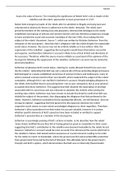Natalie
‘Assess the value of Source 7 for revealing the significance of Robert Kett’s role as leader of the
rebellion and the rebels’ approaches to local government in 1549.’
Robert Kett emerged as leader of the rebels after he admitted to illegally enclosing land and
volunteered to destroy his fences in adherence to the rebels’ demands. The rebels were
primarily members of the working class and peasantry, whereas Kett belonged to the newly-
established social group of artisans and yeomen farmers and was therefore prosperous enough
to have avoided the social and economic hardships of the late 1540s, thus making him the
subject of the rebels’ discontent. Source 7, which was written by Nicholas Sotherton ‘from the
viewpoint of the local gentry’, describes Kett’s allegiance with the rebels despite his respectable
social status. However, the source may not be entirely reliable as it was written ‘after the
suppression of the rebellion’, suggesting the local gentry would deem themselves successful
and superior, and therefore Sotherton’s account is likely to be critical of Kett and dismissive of
his successes. Therefore, while the source may be reliable as a portrayal of the opinions of the
local gentry following the suppression of the rebellion, Sotherton’s account may be tainted by
personal prejudices.
Sotherton emphasises Kett’s social status, claiming he ‘easily allowed himself to be won over
[by the rebels]’, reiterating that Kett was not a natural ally of those protesting illegal enclosures.
Kett belonged to a newly-established social class of yeomen farmers and landowners, many of
whom enclosed common land for their own benefit, which made Kett the subject of the rebels’
complaints, although this is not clarified in Sotherton’s account. Despite pledging allegiance to
the rebels, Kett clarified that he was joining them ‘not as your companion, but as your general’,
as quoted directly by Sotherton. This suggests that Kett retained the expectation of privilege
associated with his social class and was reluctant to abandon this entirely when joining the
working-class rebels. Sotherton may have chosen to include this detail to clarify that Kett was
initially the subject of the protests, thus disparaging the allegiance that Kett professed to the
rebels. However, Sotherton contradicts this by quoting Kett directly, ‘we will demand...that our
wrongs be righted’, suggesting that Kett ignored the discrepancies between the rebels’
respective social classes to some extent and pledged allegiance to them regardless. Therefore,
Sotherton’s direct quotations from Kett makes his account valuable, however it is unclear
whether specific elements of Kett’s speeches have been included or omitted to support
Sotherton’s personal bias as a member of the local gentry.
Sotherton is surprisingly praising of Kett's actions as leader, as he describes how the rebels’
‘many shouts testified the joy they felt at having gained so great an acquisition to their cause’,
suggesting that Kett’s contribution to the rebellion was deemed invaluable by the rebels he led.
However, Sotherton’s account would be more accurate if he referenced the events which led to
the rebellion’s failure. Kett lacked tactical awareness at crucial moments, leading to his order
for the rebels to march to Dussindale, where the ground was flat and provided little protection
from government forces led by the Earl of Warwick. This ultimately led to the government’s
triumph and Kett’s capture, which demonstrates that Kett was an inherently flawed leader





